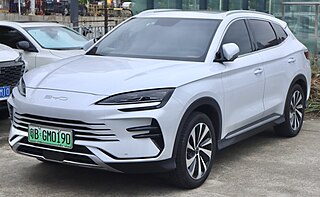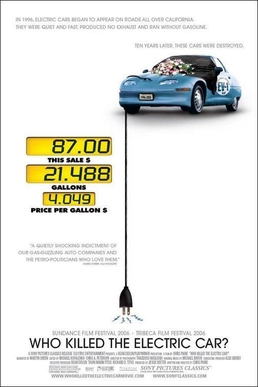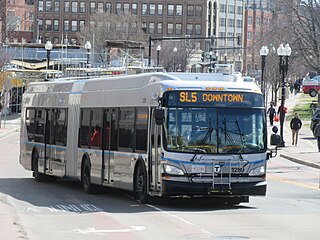
A motor vehicle, also known as a motorized vehicle, automotive vehicle, automobile, or road vehicle, is a self-propelled land vehicle, commonly wheeled, that does not operate on rails, does not fly, does not float on water, and is used for the transportation of people or cargo.

A green vehicle, clean vehicle, eco-friendly vehicle or environmentally friendly vehicle is a road motor vehicle that produces less harmful impacts to the environment than comparable conventional internal combustion engine vehicles running on gasoline or diesel, or one that uses certain alternative fuels. Presently, in some countries the term is used for any vehicle complying or surpassing the more stringent European emission standards, or California's zero-emissions vehicle standards, or the low-carbon fuel standards enacted in several countries.

A plug-in hybrid electric vehicle (PHEV) or simply plug-in hybrid is a type of hybrid electric vehicle equipped with a rechargeable battery pack that can be directly replenished via a charging cable plugged into an external electric power source, in addition to charging internally by its on-board internal combustion engine-powered generator. While PHEVs are predominantly passenger cars, there are also plug-in hybrid variants of sports cars, commercial vehicles, vans, utility trucks, buses, trains, motorcycles, mopeds, military vehicles and boats.
Shell Eco-marathon is a world-wide energy efficiency competition sponsored by Shell. Participants build automotive vehicles to achieve the highest possible fuel efficiency. There are two vehicle classes within Shell Eco-marathon: Prototype and UrbanConcept. There are three energy categories within Shell Eco-marathon: battery-electric, hydrogen fuel cell, and internal combustion engine. Prizes are awarded separately for each vehicle class and energy category. The pinnacle of the competition is the Shell Eco-marathon Drivers' World Championship, where the most energy-efficient UrbanConcept vehicles compete in a race with a limited amount of energy.

Who Killed the Electric Car? is a 2006 American documentary film directed by Chris Paine that explores the creation, limited commercialization and subsequent destruction of the battery electric vehicle in the United States, specifically the General Motors EV1 of the mid-1990s. The film explores the roles of automobile manufacturers, the oil industry, the federal government of the United States, the California government, batteries, hydrogen vehicles and consumers in limiting the development and adoption of this technology.
Hybrid vehicle drivetrains transmit power to the driving wheels for hybrid vehicles. A hybrid vehicle has multiple forms of motive power, and can come in many configurations. For example, a hybrid may receive its energy by burning gasoline, but switch between an electric motor and a combustion engine.

Challenge X: Crossover to Sustainable Mobility, known more commonly as Challenge X, was a four-year competition series amongst engineering students from across North America. Its purpose was to advance vehicle technology towards a goal of sustainable mobility.

A hybrid electric vehicle (HEV) is a type of hybrid vehicle that couples a conventional internal combustion engine (ICE) with one or more electric engines into a combined propulsion system. The presence of the electric powertrain, which has inherently better energy conversion efficiency, is intended to achieve either better fuel economy or better acceleration performance than a conventional vehicle. There is a variety of HEV types and the degree to which each functions as an electric vehicle (EV) also varies. The most common form of HEV is hybrid electric passenger cars, although hybrid electric trucks, buses, motorboats, and aircraft also exist.

The Chevrolet Volt is a plug-in hybrid and extended-range electric vehicle car that was manufactured by General Motors, and also marketed in rebadged variants as the Holden Volt in Australia and New Zealand and the Buick Velite 5 in China, and with a different fascia as the Vauxhall Ampera in the United Kingdom and as the Opel Ampera in the remainder of Europe. Volt production ended in February 2019.

Andrew Alfonso Frank is an emeritus American professor of Mechanical and Aeronautical Engineering at University of California, Davis. He is recognized as the father of modern plug-in hybrids, and coined the term Plug-in Hybrid Electric Vehicle (PHEV).
The Office of Energy Efficiency and Renewable Energy (EERE) is an office within the United States Department of Energy. Formed from other energy agencies after the 1973 energy crisis, EERE is led by the Assistant Secretary of Energy Efficiency and Renewable Energy, who is appointed by the president of the United States and confirmed by the U.S. Senate. Alejandro Moreno currently leads the office as the Acting Assistant Secretary.
The Wisconsin Hybrid Vehicle Team consists mainly of undergraduate students from the University of Wisconsin–Madison who work together to build a hybrid electric vehicle.

Miles per gallon gasoline equivalent is a measure of the average distance traveled per unit of energy consumed. MPGe is used by the United States Environmental Protection Agency (EPA) to compare energy consumption of alternative fuel vehicles, plug-in electric vehicles and other advanced technology vehicles with the energy consumption of conventional internal combustion vehicles rated in miles per U.S. gallon.
EcoCAR: The NeXt Challenge was a yearly competition from 2008 to 2011, that built on the 19-year history of U.S. Department of Energy (DOE) advanced vehicle technology competitions by giving engineering students the chance to design and build advanced vehicles to demonstrate cutting-edge automotive technologies, with the goal of minimizing the environmental impact of future personal transportation. The DOE has again joined General Motors (GM), the Government of Canada, and other sponsors for this new competition series, named the EcoCAR Challenge. Argonne National Laboratory, a DOE research and development facility, will organize and operate the EcoCAR Challenge. Some previous types of advanced vehicle technology competitions include FutureTruck, FutureCar, and Challenge X. these type of competitions are usually supported by one or more of the Big Three American Automobile Manufacturers.

The adoption of plug-in electric vehicles in the United States is supported by the American federal government, and several states and local governments.

The fleet of hybrid electric vehicles in the United States, with 8.5 million units sold through December 2023, is the second largest in the world after Japan. American sales of hybrid electric vehicles represented about 36% of the global stock of hybrids sold worldwide through April 2016.
The University of Kansas Sustainable Automotive Energy Infrastructure Initiative, or more commonly referred to as the KU Ecohawks is an ongoing project that works to promote sustainability in the automotive sector. Founded during the beginning of the Automotive industry crisis of 2008–2010 in the U.S., the group recycles old vehicles to run on community wastes and renewables, especially on the University of Kansas campus and not rely on conventional fossil fuel sources that pollute the local and global environment.
Advanced vehicle technology competitions (AVTCs) are competitions sponsored by the United States Department of Energy, in partnership with private industry and universities, which stimulates "the development of advanced propulsion and alternative fuel technologies and provide the training ground for the next generation of automotive engineers."

As of 2019, the automotive industry in Thailand is the largest in Southeast Asia and the 10th largest in the world. The Thai industry has an annual output of more than two million vehicles, more than countries such as Belgium, Canada, the United Kingdom, Italy, Czech Republic and Turkey.














